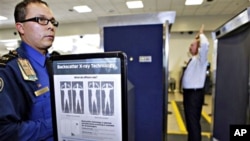Many religious people - including Muslims, Jews, Christians and Sikhs - are upset about the increasingly invasive security procedures at American airports. Although some are refusing to fly, others say they have no option but to endure the full body scans and frisking.
The departure terminal at Washington DC's Dulles International Airport teems with people from many lands and cultures.
Lila al-Hayek is about to travel back to Saudi Arabia with her family, but she seems worried. Her entire body except for her eyes is concealed by a niqab, the black veil worn by woman in her country. "We went like three or four weeks ago to (Las) Vegas and someone chose us to pat down."
"And this was two different flights," said Jenan Sharrofna, a friend of the family who also went on the trip to Las Vegas. She believes she was selected for the full body frisking known as a pat down, because she wears a hijab, another kind of headscarf that leaves only her face visible. "They say it's random. But I went with my sister and we both had to go through that security and we didn't want it, we didn't like it."
Since a failed attempt to bomb an airplane a year ago in Detroit, Michigan by a Nigerian man who hid explosives in his underwear, the U.S. Transportation Security Administration has installed full-body scanners at scores of airports across the country, including Dulles.
The TSA says anyone who refuses to go through one will be subject to alternative measures - including pat downs by someone of the same sex. The agency says less than three percent of travelers receive a pat down.
But Ameena Qazi of the Council on American-Islamic Relations says some groups are singled out. "We are deeply concerned that there is some sort of profiling going on in regard to women who wear the scarf, the headscarf, or Sikh men who wear the turban, in their constant and almost 100 percent hit rate in their being referred to secondary screening," she said.
The TSA declined an interview for this story. But an official did say that while the agency does not racially profile passengers, it does implement security measures based on intelligence and current threats.
In a written statement, the TSA said its agents are sensitive to religious and cultural needs of passengers, and are trained to treat each passenger with respect and dignity.
Hardayal Singh is the director of international and community affairs for United Sikhs. He says the turban is a source of pride for Sikh men and yet he has heard many complaints about the behavior of TSA agents. "A turban can be touched only by yourself, but it's at your will and only when you want to be touched not that someone is dictating to you that "I want you to touch the turban now," he said.
Other religious groups including conservative Christians and Orthodox Jews have expressed concerns about the body scans - which have been likened to a "digital strip search."
Rabbi Saul Zucker of the Orthodox Union says a pat down can violate the Jewish principle of tzniut, or modesty, even if it is carried out by a member of the same gender. "An extensive pat down, a whole body pat down itself, is something that lacks a certain dignity and propriety and modesty, and particularly if the procedure itself is visible to other people, because these things are not always 100 percent private - I do a lot of air travel myself and I know this - it's uncomfortable, it's undignified and again it's an issue of modesty," he said.
Back at Dulles airport, al-Hayek's family recalls that she was in tears over the pat down, which caused them to miss their flight to Las Vegas.
Still, Sharrofna says her displeasure with the procedure will not keep her from flying. "I want to travel the world. I want to see places. So I don't see why it has to be me and not the lady without a scarf next to me or behind me," she said.
US Religious Groups Upset over Airport Security Procedures








